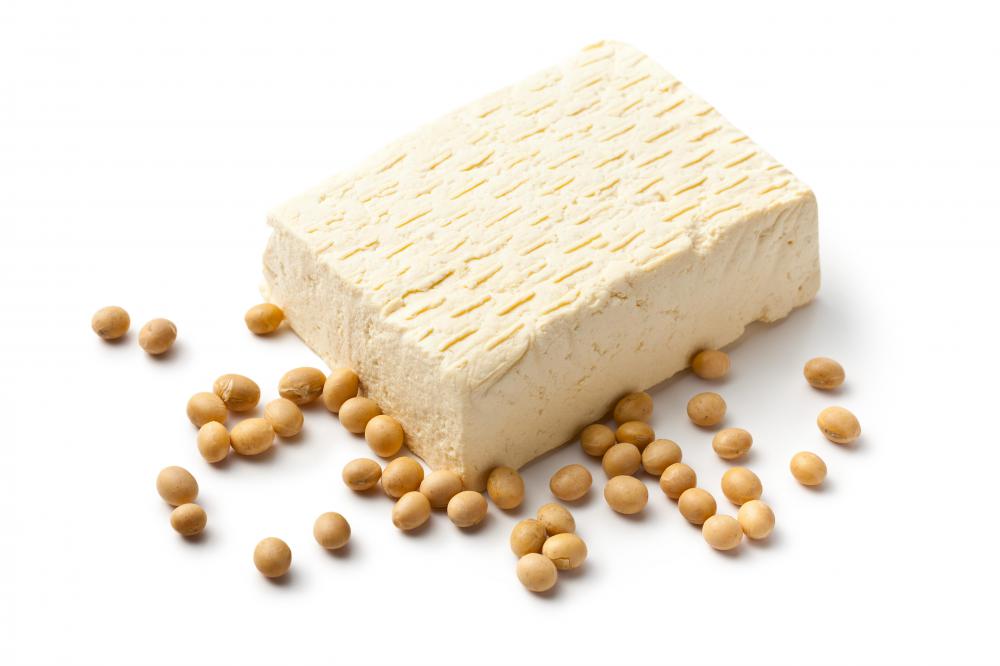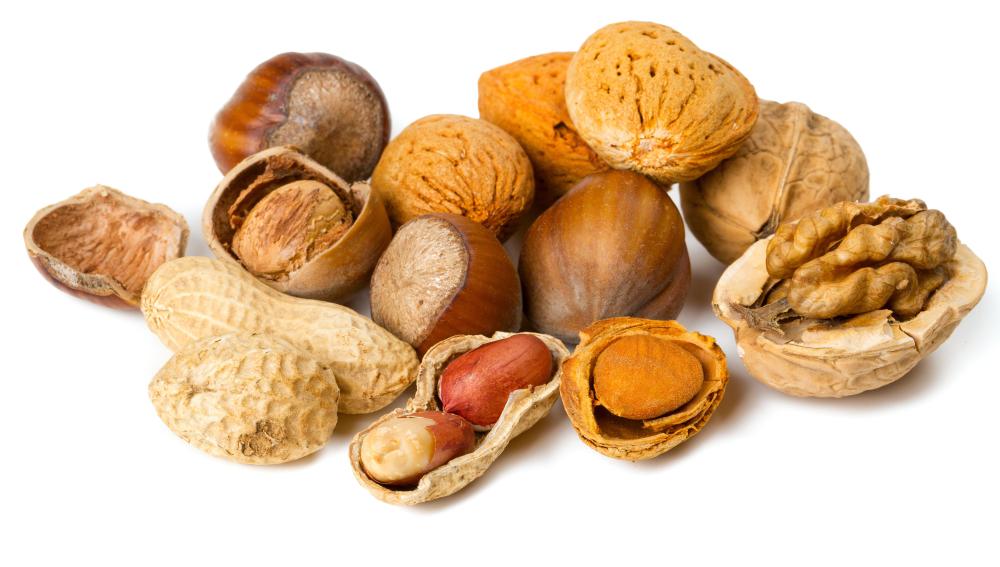At TheHealthBoard, we're committed to delivering accurate, trustworthy information. Our expert-authored content is rigorously fact-checked and sourced from credible authorities. Discover how we uphold the highest standards in providing you with reliable knowledge.
How Much Protein Should I be Getting Daily?
How much protein you should get on a daily basis really depends on your age and weight. Infants need more protein than do adults, and pregnant women may benefit from higher protein levels than women who are not pregnant. While there is some debate about how much protein people actually need, there are two fairly standard ways to determine how much you should get.
The average adult can calculate his or her required protein by weight, provided the person's weight is fairly normal for his or her height. This measurement is based on kilograms, but you can also use pounds. Every 2.2 pounds (1 kg) a person weighs translates to a protein need of 0.6 - 0.8 grams. So a man who weighs 220 pounds (100 kg) would need roughly 80 grams of protein a day. This measurement is actually a little high, and a better estimate might be to say that the average adult male should have between 50 - 60 grams of protein a day, and most women need about 40 - 50 grams a day.

Infants need significantly more protein. They should eat approximately 2 grams per 1 pound (0.45 kg) of weight each day, more than double adult intake. Breastfeeding and pregnant women should increase their protein intake by about 10 grams a day. In other words, if a woman is eating about 40 grams normally, she should bump this to 50 grams if she's pregnant.

A better way to determine how much protein you should eat each day is to evaluate your caloric intake. Most medical professionals recommend that you aim for making sure 10 - 30% of your caloric intake is protein, although some recommend a lower 10 - 15%, and others a higher amount. If you eat 2,000 calories a day, you should make sure that at least 200 of those calories come from protein. By choosing lean protein sources like non-fat dairy, lower fat meats, and things like tofu and legumes, you can easily get 50 grams of protein a day without hugely increasingly your calories.

In developed countries, most people don’t really have to measure how much protein they’re getting. The issue becomes more serious in countries where people have poorer food sources or suffer from routine malnourishment. Protein provides humans with certain essential amino acids that our bodies cannot produce. Not getting all of these amino acids can have significant health consequences.

Vegetarians have to think about the types of protein they’re getting in addition to determining how much protein they need. Many vegetable proteins are incomplete and need to be paired with others to make them complete (containing all amino acids). This can be accomplished with a little thinking and planning.
AS FEATURED ON:
AS FEATURED ON:















Discussion Comments
I have type 2 diabetes, meaning my insulin is high, and I find that if I don't have enough protein, I crave sweet foods. I would say, eat 10 grams of protein for breakfast, 20-25 grams of protein for lunch and 15-20 grams of protein for dinner, plus up to 5 grams of protein for snacks. But just eating protein is not enough. The meal should be balanced, meaning the meal should contain protein, grains, vegetables and fruits with enough water.
@ZipLine--No, not grams of food, grams of protein. You can look up how much protein foods contain.
For example, if you have one cup of milk, you will get about eight grams of protein from that. If you have a piece of steak the size of a deck of cards, you will get twenty-one grams of protein.
So an adult male who has a serving of meat, two servings of dairy and a serving of beans would have his required amount of protein for that day.
50-60 grams of protein per day for an adult male-- is that grams of food?
So do I need to eat 50-60 grams of meat every day?
I'm confused. And how much protein at once can our body digest?
Aside from how much protein per day we're getting, it matters what kind of protein we're getting too, right?
I know that red meat has the most protein and it's good to have red meat a couple of times a week. But it's also rich in cholesterol and having meat every day is not really healthy.
I'm not a nutrition expert but I think that I have balanced my protein intake. I make sure that I get non-meat sources of protein every day like eggs, beans or dairy. And then I try to have meat sources of protein three times a week like chicken, fish or red meat.
I'm not sure what a nutritionist would say about this but it works for me.
My niece is a vegetarian and I always wonder if she is getting enough protein. I know there are other ways besides meat to get protein, but this is the most common way. I think I would be hungry all the time if I didn't eat meat with my meals.
What are some of the foods that must be combined for a vegetarian to get a complete protein?
Protein helps keep your blood sugar stabilized so it isn't spiking all over the place. I find that I get sugar cravings if I don't eat enough protein.
If I want an extra burst of energy without a lot of extra calories I keep a jar of protein powder on hand. Sometimes this is a meal in itself, or I add it to smoothies for some extra protein.
If someone is tired all the time or fighting fatigue you might want to keep track of how much protein you are getting. This can really make a difference in your energy if you start getting as much protein as you need in a day.
I never realized that infants needed so much protein, but this makes sense since their bodies are growing so rapidly during this time.
I know I have more energy and feel more satisfied when I have protein with my meals. I usually try to get at least 10 grams a of protein just at breakfast. This is easy to do with some of the healthy whole grain cereals or a bowl of oatmeal with flax seed added.
My uncle is a personal trainer, and people are always asking him, “How much protein can the body absorb at once?” They are afraid that if they eat too much of it at one meal, some of it will be wasted if the body can't take it all in quickly.
He tells them that the body can actually use all of the protein that you consume. It just takes its time.
So, if you eat a big chunk of meat, the protein will get used over several hours. If you drink a protein shake, you will absorb it more quickly. However, no protein that you eat will go to waste.
@wavy58 – You are eating half the protein that my friend is right now. He is doing some bodybuilding, and how much protein he needs differs from what the average person needs.
He is currently eating two grams per kilogram of body weight. This is quite a bit of protein. If he got his protein from meat alone, he would probably get sick of eating meat, but he gets some of it from nuts, beans, and dairy products.
I volunteered to take part in a clinical trial for a new drug to treat kidney disease, and the researcher told me that I would need to limit my protein intake. When I asked her how much protein per day I could eat, she told me one gram per kilogram of body weight.
Since I weigh 130 pounds, this translates to 58 grams of protein. I have found out that an egg contains about 6 grams of protein, and one chicken breast has about 30. This has helped me plan my meals accordingly, since I eat both eggs and chicken nearly every day.
It's really hard to measure how much protein you are getting from meat, unless you have a kitchen scale and you plop meat down onto it. I'm glad I don't have to keep up with this, because it would be frustrating.
It's easy to determine the amount of protein in other items. Packaged yogurt and canned beans have the protein amounts in grams written on the nutrition label.
- anon82936 is insane. Candida absolutely does not form in your body as a response to an excess of protein. It is a living organism--a yeast--and the body doesn't form it all.
No way, too much protein will give you so many different health problems caused by candida which is formed is your body by an excess of protein. To get rid of candida you have to go through a process that will take some time and control from you and you will get as a result more energy, life and the prevention of many health issues.
Eating enough protein daily is vital in keeping the blood level sugar level.
Post your comments